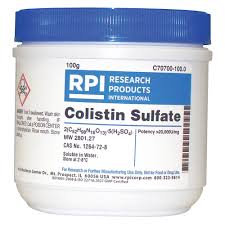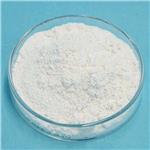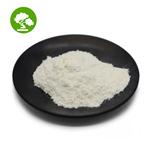An antibiotic-colistin sulfate
Colistin sulfate is a polypeptide antibiotic which inhibits gram-negative bacteria by binding to lipopolysaccharides and phospholipids in the outer cell membrane of gram-negative bacteria.
Chemically, colistin is a polypeptide, reported by Suzukiet al. whose major component is colistin A. They proposedthe structure for colistin A differs from polymyxin B only by the substitution of D-leucine for D-phenylalanine as one of the amino acid fragments inthe cyclic portion of the structure. Wilkinson and Lowehave corroborated the structure and have shown that colistinA is identical with polymyxin E1.

Pharmacodynamics
Colistin is a polymyxin antibiotic agent. Polymyxins are cationic polypeptides that disrupt the bacterial cell membrane through a detergentlike mechanism. With the development of less toxic agents, such as extended-spectrum penicillins and cephalosporins, parenteral polymyxin use was largely abandoned, except for the treatment of multidrug-resistant pulmonary infections in patients with cystic fibrosis.
More recently, however, the emergence of multidrug-resistant gram-negative bacteria, such as Pseudomonas aeruginosa and Acinetobacter baumannii, and the lack of new antimicrobial agents have led to the revived use of the polymyxins.
In Vitro
Colistins are bactericidal to gram-negative bacteria by a detergent-like mechanism. This mechanism involves interaction with lipopolysaccharides and phospholipids of the outer membrane and electrostatic interference with the outer membrane by competitively displacing divalent cations (calcium and magnesium) from the negatively charged phosphate groups of membrane lipids.
Colistin (polymyxin E) owns favorable properties of rapid bacterial killing, a narrow spectrum of activity, and an associated slow development of resistance for the treatment of infections caused by multidrug-resistant gram-negative bacteria. There are two forms of colistin available commercially: colistin (sulfate) mainly for topical use and colistin methanesulfonate (sodium) for parenteral use.
Mechanism of action
Colistin is a surface active agent which penetrates into and disrupts the bacterial cell membrane. Colistin is polycationic and has both hydrophobic and lipophilic moieties. It interacts with the bacterial cytoplasmic membrane, changing its permeability. This effect is bactericidal. There is also evidence that polymyxins enter the cell and precipitate cytoplasmic components, primarily ribosomes.
);You may like
Lastest Price from Colistin sulfate manufacturers

US $0.00-0.00/kg2024-04-16
- CAS:
- 1264-72-8
- Min. Order:
- 1kg
- Purity:
- 19500U/mg
- Supply Ability:
- 1000kg

US $0.00/kg2024-04-12
- CAS:
- 1264-72-8
- Min. Order:
- 1kg
- Purity:
- 99%
- Supply Ability:
- 2000ton


